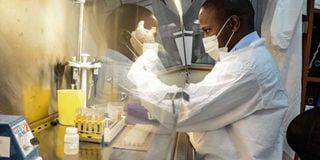Virus infections to keep rising for next 3 months, experts say

A researcher prepares reagents for testing the samples for the Covid-19 coronavirus at the laboratory of Kenya Medical Research Institute (Kemri) where they have the capacity to test 384 samples per day in Kisumu, western Kenya, on April 23, 2020.PHOTO | BRIAN ONGORO | AFP
What you need to know:
- Epidemiologist Thumbi Mwangi said the disease will not peak until herd immunity is achieved in the next three months.
- But this is dependent on whether the current containment measures are maintained.
- The expert from the Institute of Tropical Infectious Diseases at the University of Nairobi said Until 70 per cent of Kenyans have contracted the virus, then the disease will not have peaked.
Covid-19 infections will continue to increase exponentially in the country in the next three months, experts have said.
In an interview, epidemiologist Thumbi Mwangi said the disease will not peak until herd immunity is achieved in the next three months. But this is dependent on whether the current containment measures are maintained.
The expert from the Institute of Tropical Infectious Diseases at the University of Nairobi said until 70 per cent of Kenyans have contracted the virus, then the disease will not have peaked. According to Dr Mwangi, the peak will occur in the last quarter of the year, based on current models.
“If the measures in place right now are not maintained, the peak will be sooner,” he said.
If the peak occurs in November, it will be a low peak, meaning that there will be less sick people at the same time, he said. But if the peak is sooner, it will be a high peak with many people infected at the same time.
“If we are opening up, we should expect to see a surge in a short time. The question is, will the government have the capacity to handle the increased numbers?” posed Dr Mwangi.
Dr Githinji Gitahi, the chief executive officer of Amref Health Africa, said the peak is the point past which the number of those getting infected starts to drop, and this will not be attained until September or October in the current setting. He added that the curve is currently “flatter” since a surge would overwhelm the health system.
“We are reducing the rate of infections so that there is capacity to test and treat people,” he said.
“But the President can open the economy if enough measures have been put in place,” he said, and added that flattening the curve does not mean there are no new infections. With herd immunity, the immune population (recoveries) dilutes the population that is susceptible to the virus.
“Once the disease has spread very much in a population, there is less likelihood of an epidemic,” Dr Gitahi said.
This is where antibody tests become important so as to establish the population that has been exposed to the virus, said Dr Mwangi.
In April, Acting Health Director-Genaral Patrick Amoth predicted that there would be 1,000 cases in the first week of April and 5,000 by mid-April, but this did not happen.
According to Dr Mwangi, this was because of the measures the government took including curfews and cessation of movement.





